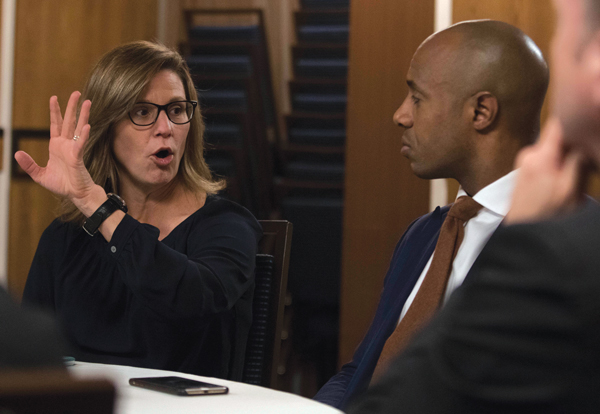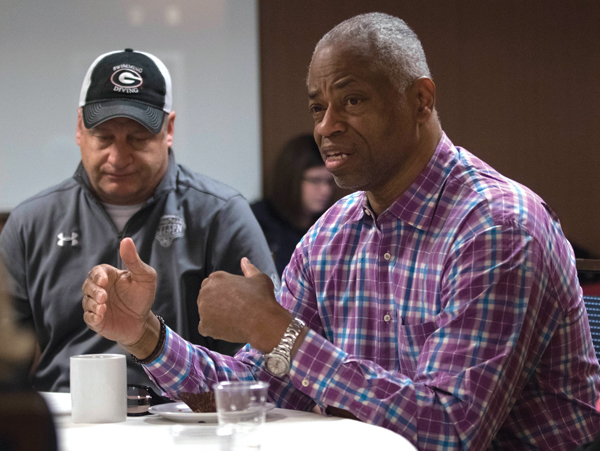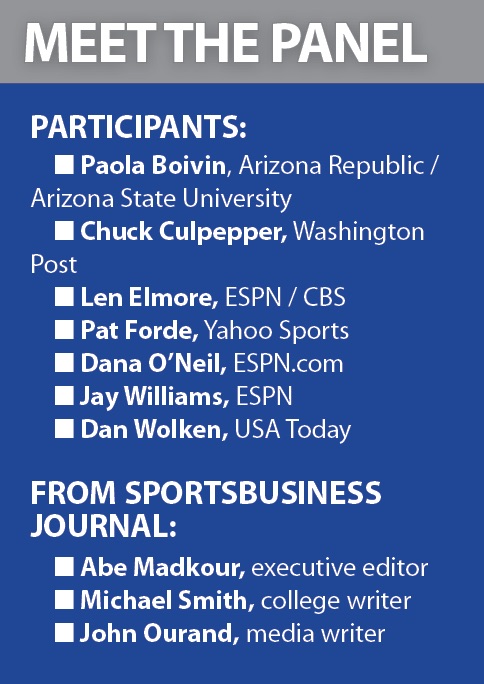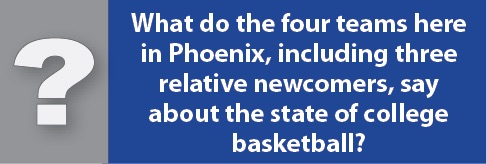Seven of the most respected authorities on intercollegiate athletics gathered in Phoenix during the Final Four to form SportsBusiness Journal’s first sports media roundtable. They came from TV, digital and print. Some used to play the game. Some have been covering the games and all the trappings of college sports for 30 years or more.
What they all have in common is that they have a passion for the future of the enterprise, which came through loud and clear during the 90-minute roundtable discussion. In this two-part series, the topics range from the NCAA’s investigation of national champion North Carolina to athlete compensation, from LaVar Ball to the coach you’d want if you had to win one game.
We begin with Part 1 in this edition, followed by Part 2 on April 17.
Podcast highlights from the discussion:
■ PAT FORDE: It’s a testament that, except for rare occasions, you still need veteran players, other than Kentucky 2015, Duke 2012. Even that Kentucky 2015 (team) ran into all of those old Wisconsin guys. I just think the recipe to win, more times than not, is with good older players as opposed to great freshmen.
■ DANA O’NEIL: I did a story looking back at recent champions, and even with that Duke team, Quin Cook was the guy that held those freshmen together. He made them better. Every coach would agree in pressure situations that the young guys don’t handle it quite as well.
■ PAOLA BOIVIN: Gonzaga is a testament to that. They make smart plays — their passing, their decision-making.
■ DAN WOLKEN: As a corollary to that, I compiled some stats and since 1970, 65 percent of the spots in the Final Four have gone to 16 schools. That’s a pretty astounding number. For all the talk about the tournament being wide open, it’s mainly a blue-blood sport. Now you’ve got three teams in the Final Four for the first time and I’m curious: Is that an anomaly or a shift?
■ O’NEIL: South Carolina, three weeks ago, couldn’t score 20 points in a half and now they’re here. They have absolutely caught lightning in a bottle at the exact right time.
 |
ESPN commentator and former Duke player Jay Williams listens to ESPN.com’s Dana O’Neil as they discuss the state of college basketball.
Photo by: DARRYL WEBB
|
■ LEN ELMORE: That’s the thing about college basketball. The tournament is a separate season. It shows me you need a transcendent player who can carry you. Look at guys like (Oregon’s Tyler) Dorsey who doubled their average in the tournament. The thing I remind people is that this is a six-game tournament and the best team doesn’t always win it.
■ JAY WILLIAMS: Just look at Gonzaga. (Before the finals), they hadn’t played a 3 seed or higher.
■ CHUCK CULPEPPER: For the sake of merit, all the rounds should be best-of-7. (laughs) And we’ll play until July.
■ WILLIAMS: Have the championship on the Fourth of July.
■ CULPEPPER: That whole question of aristocracy, what if we didn’t have North Carolina here? What if it was Butler? Are we required to be bummed out if we had all four interlopers?
■ ELMORE: We’d adjust.
■ BOIVIN: We’ve been writing stories in the Republic about how sad the ticket brokers are. That can be reflective of how interested people are in it.
■ O’NEIL: I was in New York for the regional and the people there thought it was going to be Villanova-Duke. The place was bananas. My friend was going to buy tickets and I said, “Twenty bucks will get you in.” She couldn’t find anything less than $250. I think with South Carolina it was, “Hey, this may never happen again, let’s go.” The Garden was on fire.
■ ELMORE: The reason why we need the blue bloods is that we know who they are. We identify with them because we’ve been (following) them all year.
■ WILLIAMS: We have so many college games on TV, it can be daunting.
■ O’NEIL: Ratings are down everywhere, right? The NFL. It’s because of this (points to phone).
■ WOLKEN: I’ve banged this drum for a long time. We’ve got 335 schools in Division I and a lot of these schools are so massive. It’s a 30-game season and you’re playing a third of your season against nobodies. How are you supposed to grow your sport when literally a third of your season is a throw-away.
| Year |
Network(s) |
Average # of viewers (000s) |
| 2017 |
CBS |
22,998 |
| 2016 |
TBS/TNT/truTV* |
17,752 |
| 2015 |
CBS |
28,263 |
| 2014 |
CBS |
21,196 |
| 2013 |
CBS |
23,426 |
| Year |
Network(s) |
Average # of viewers (000s) |
| 2017 |
CBS |
19,067 |
| 2016 |
TNT/TBS/truTV* |
13,717 |
| 2015 |
CBS/TNT/TBS/truTV* |
21,739 |
| 2014 |
CBS/TNT/TBS/truTV* |
16,103 |
| 2013 |
CBS |
18,260 |
| Year |
Network(s) |
Average # of viewers (000s) |
| 2017 |
CBS/TNT/TBS/truTV |
10,827 |
| 2016 |
CBS/TNT/TBS/truTV |
9,300 |
| 2015 |
CBS, TNT, TBS, truTV |
11,300 |
| 2014 |
CBS/TNT/TBS/truTV |
10,500 |
| 2013 |
CBS/TNT/TBS/truTV |
10,700 |
* Includes Team Streams on TNT and truTV
Source: SportsBusiness Daily research
■ WILLIAMS: You’re stacking wins.
■ ELMORE: It’s a throw-away because there are so many games on. Who do we highlight? It’s those 16 teams you just referenced.
■ O’NEIL: I was in West Virginia doing a story on Bob Huggins right after the SEC-Big 12 Challenge and he said, “I don’t know why we bother doing this. They tell us it’s going to be this great matchup and get all of this promotion, and all weekend (ESPN) promoted one game: Kentucky and Kansas. Nobody knew I was playing. Why am I doing this in the middle of my conference season and the only return I get is probably a loss.”
■ WILLIAMS: We did Kentucky-Kansas for “GameDay” and the next week was Arizona-Oregon, a massive game, a top-10 matchup. But instead of going to Arizona-Oregon, we went to Kentucky-Florida because we knew it would rate better.
■ WOLKEN: I just don’t know how you grow a sport when you wave a white flag for two months and say, “We don’t matter.”
■ ELMORE: Well, you can’t say it hasn’t grown. It’s grown incredibly since I played.
■ O’NEIL: Do you need 30 games in a regular season, though? The teams that make it to the championship are playing 40 games. Is that necessary?
■ FORDE: That’s why there’s a lot of talk about moving back the start of the season. Playing better games earlier in the season … is something Dan Gavitt and the basketball committee has talked about quite a bit. Obviously, they wouldn’t do it without the TV partners. One of the things I really like about Dan is that he’s willing to upset the apple cart and try different things.
■ ELMORE: Back in the day when I played, we started on Dec. 1.
■ BOIVIN: To Dana’s point about ratings being down, the networks have to get ahead of this story and they are. I teach a class at ASU — Sports and Media in the 21st Century. I asked them how many watched a game of the NCAA Tournament on TV. It was like two out of 42 students. They’re all watching on their phones.
■ ELMORE: The same people who put the games on TV also are putting them on the phones. They’re cannibalizing their own product.
■ FORDE: Everybody used to want the 55-inch screen at home and now everybody wants this (phone).
■ ELMORE: It’s hard to carry around that 55-inch screen. (laughs)
■ O’NEIL: One story that’s going to get interesting is Duke and Krzyzewski. The clock is ticking. When does he go and who comes next?
■ WILLIAMS: Don’t look at me. (laughs)
■ O’NEIL: With the season they’re coming off of and all that drama, it’s all kind of coming together into something and I’m not sure what’s going to happen.
■ WOLKEN: Well, him, Roy, Boeheim, Pitino.
■ O’NEIL: Boeheim’s going to coach until he’s 85, didn’t you hear? (laughs)
■ FORDE: Well, nobody’s going to tell Boeheim when it’s time to go.
■ WOLKEN: Who are the big personalities under 50 who are going to carry the sport?
■ O’NEIL: Jay Wright could be one. Calipari.
■ WILLIAMS: Shaka Smart.
■ O’NEIL: Shaka’s got to get a better team.
■ FORDE: Gregg Marshall.
■ ELMORE: Sean Miller. But he doesn’t have that big personality, though.
■ FORDE: Yeah, he wants to be left alone.
■ BOIVIN: Gonzaga is an interesting story to me because the AD and the coach have been together 18 years. You just don’t see that in college sports anymore. I don’t even know if it’s possible these days, but it sure sounds like a recipe for success.
■ FORDE: I wrote a story about the possibility of Gonzaga winning the year after Villanova and the rise of what I called the boutique basketball schools that don’t play (FBS) football and don’t have football revenue. But they treat basketball like a power football program. Why can’t Wichita State … Wichita State’s going to be great next year. VCU, Dayton, Xavier, Butler.
■ O’NEIL: That goes back to what we were saying about the teams with seniors and the ability to stay together longer. And you’re also seeing coaches make the decision to stay put, whereas in the past you had to go.
■ FORDE: Give Mark Few $1.8 million and a fly rod, and he’s happy.
■ O’NEIL: Exactly.
 |
CBS and ESPN commentator Len Elmore, a former college and NBA player, with Yahoo Sports’ Pat Forde in the background.
Photo by: DARRYL WEBB
|
■ WILLIAMS: A few years ago I coached at Dwyane Wade’s fantasy camp. It’s at the Fontainebleau and everybody has a great time. I was an assistant coach to Frank Martin. Frank was very intense, way more intense than any coach I’d seen at a fantasy camp. He’s from Miami and there was a high school ref we had. He looked at me and said, “I may lose my mind today. If I get kicked out, I need you to get us to the championship game.” I guess he and this ref had a beef from back in the day. It’s a fantasy camp, but he coached our guys so hard. And it just made me think, as a society, we are so sensitive to everything people say. Is that a coaching style that can exist in the future or are we going in a completely different direction?
■ O’NEIL: Huggins, Izzo. There’s still a lot of coaches who have no problem getting in players’ faces.
■ WILLIAMS: ‘K’ is like that.
■ ELMORE: But the great ones know how to balance it. They will lay you out and then tell you how great you are. Kids can appreciate that.
■ O’NEIL: You can’t have a 20-year-old running the team.
■ CULPEPPER: I think there are a lot of coaches like that and they just don’t show us.
■ O’NEIL: Jay Wright is a very nice man, and he’s awful in practice.
■ WOLKEN: There’s this image of Nick Saban that he’s this incredible hard-ass, but when you talk to people at Alabama, he relates to his guys on a different level behind the scenes. It’s not so much that you’re a tough coach or not, it’s more about whether guys think you’re authentic and real.
■ O’NEIL: Huggins’ practices are three hours of … I’d be wilting. But his players love him.
■ FORDE: If you have football, most feel compelled to be good at football, and that’s what has led to this arms race with the facilities. Kansas is probably just fine being terrible at football as long as they’ve got great basketball. But for the most part, I think a lot of schools would invest heavily if they thought they could be Gonzaga.
■ O’NEIL: The really good cautionary tale in all this — you can’t forget who you are — is UConn. UConn went out and chased the football dollar, football didn’t take off, and now basketball is going down the drain. You’re in a league that makes no sense, you have no rivals and you chase football. Where has it gotten you? Temple as well, to an extent.
■ WOLKEN: One of the things economically that a lot of these power five football schools deal with … they can put as much money into basketball as they want. If they maximize how good they can be, it’s still going to represent a small chunk of their revenue. It comes down to ambition and vision, and some will choose not to be that good in basketball. That’s what keeps the door open for Gonzaga and everybody else.









